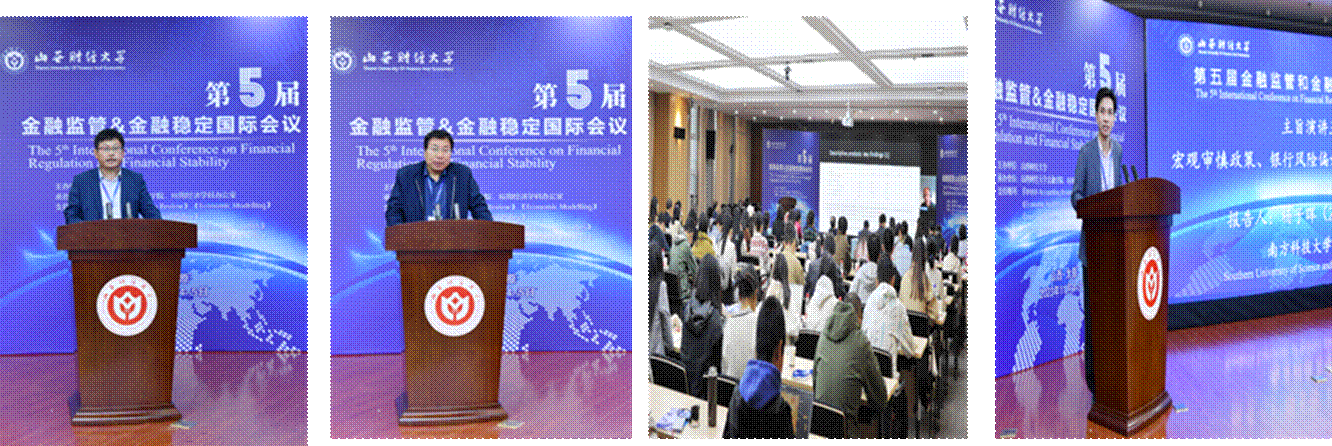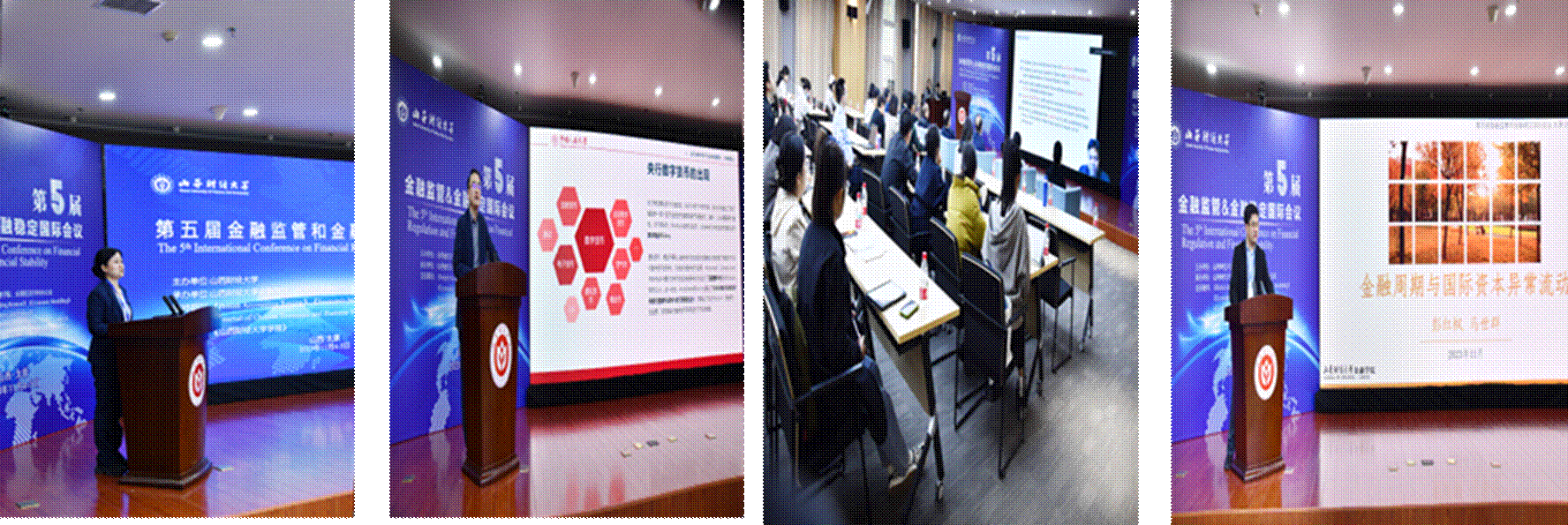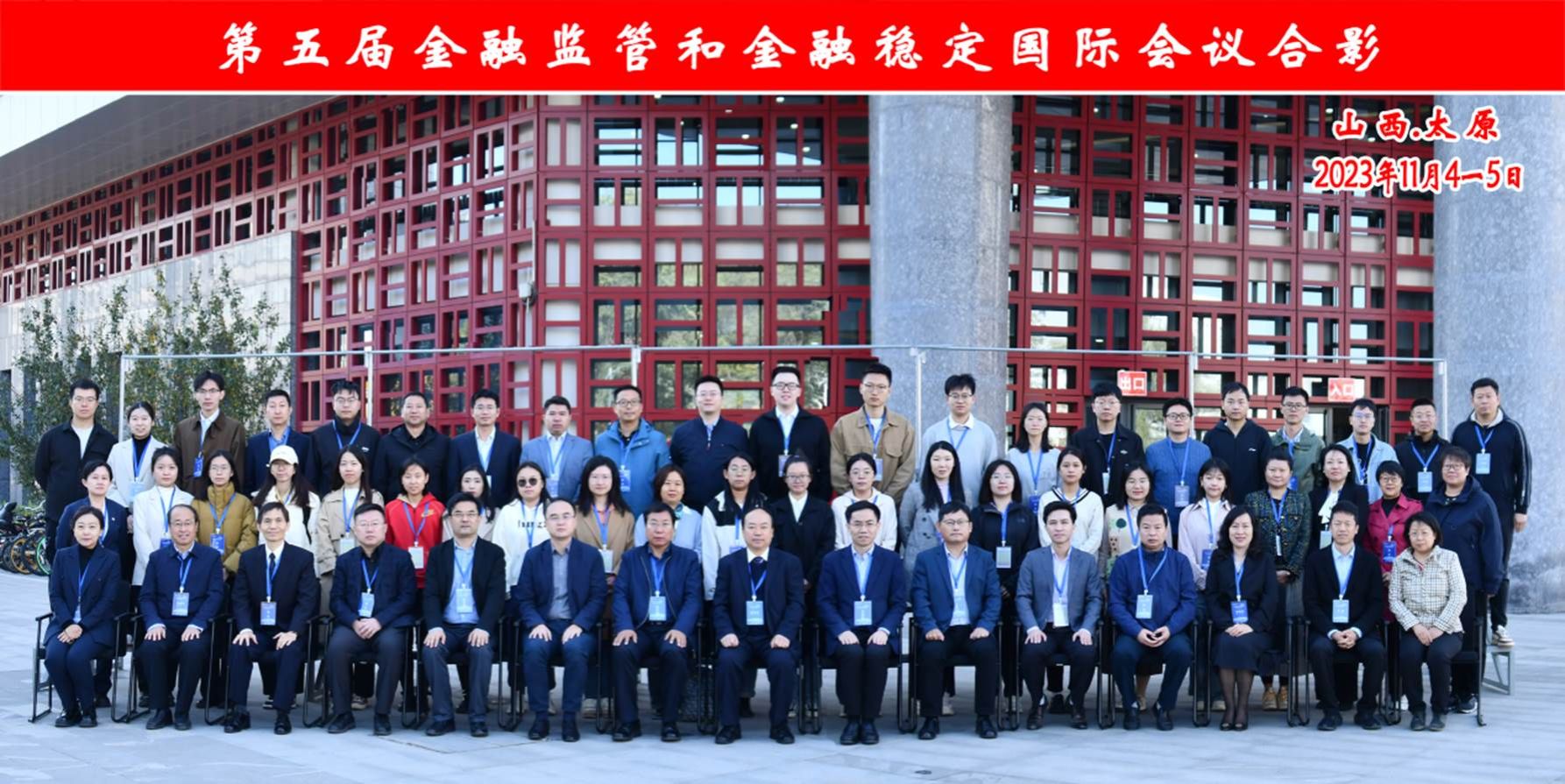From November 4th to November 5th, 2023, the Fifth International Conference on Financial Regulation and Financial Stability, hosted by Shanxi University of Finance and Economics, co-organized by the School of Finance and the Discipline Office of Applied Economics, and supported by British Accounting Review, Economic Modelling, Economic Analysis and Policy, the Journal of Chinese Economic and Business Studies, Journal of Management Sciences in China and Journal of Management Science and Engineering, Journal of Shanxi University of Finance and Economics was successfully held in our University. Nearly 100 experts and scholars from many universities and research institutes at home and abroad, including the University of Liverpool, Fordham University, Queen Mary University of London, the University of Edinburgh, Nankai University, Xiamen University, Central University of Finance and Economics, Shanghai University of Finance and Economics, Southeast University, Hunan University, Northwest Agriculture and Forestry University, Tianjin University, Shanxi University, etc., shared their academic achievements and views on the theme of “Financial Regulation and Financial Stability” and discussed academic, industrial and policy issues in this field, so as to produce more research results for the prevention and resolution of major financial risks.
The opening ceremony and keynote speeches of the 5th International Conference on Financial Regulation and Financial Stability were held on November 4th. Prof. Li Jingping, Dean of the School of Finance, Shanxi University of Finance and Economics, presided over the opening ceremony, and the keynote speakers included Prof. Liu Xiaoxing of Southeast University, Prof. Wang Chongrun of Hebei University of Economics and Business, and Prof. Li Jingping as well as Prof. Cui Jie of Shanxi University of Finance and Economics. Prof. Shen Peilong, member of the Standing Committee of the Party Committee and Vice President of Shanxi University of Finance and Economics, made an opening speech on behalf of the University. He firstly expressed his welcome and heartfelt thanks to the leaders, experts, scholars and colleagues attending the conference. Meanwhile, he pointed out that finance is the core of modern economy and financial security is an important part of national security. The previous five national financial work conferences have emphasized the importance of financial regulation and financial stability, and the just-concluded Central Financial Work Conference has also particularly pointed out the need to accelerate the construction of a strong financial country, comprehensively strengthen financial regulation, improve the financial system, optimize financial services, and prevent and resolve risks. Learning and implementing the spirit of the Central Financial Work Conference is the proper meaning of the 5th International Conference on Financial Regulation and Financial Stability. This conference will focus on major issues in China's financial regulation and financial stability, unswervingly take the road of financial development with Chinese characteristics, promote the high-quality development of China's finance, and provide strong support for comprehensively advancing the construction of a strong nation and national rejuvenation with Chinese-style modernization. It is hoped that this conference will provide reference for the prevention of major financial risks in China, and jointly make greater contributions to the research on financial regulation and financial stability in China.
Prof. Tian Xiangyu, Deputy Secretary of the Party Committee, President and Doctoral Supervisor of Shanxi University of Finance and Economics, gave a keynote speech entitled “Innovation of Financial Regulation in the Era of Digital Economy”, claiming that, on the one hand, the digital economy has endowed financial regulation with a lot of new features, which has made financial regulation comprehensive and quantitative, and at the same time, made the scenarios of financial regulation more and more complex. On the other hand, the construction of financial data platforms is gradually diversifying and ecologizing, and data security and cross-border regulation have become new regulatory challenges. Therefore, financial regulators need to actively strengthen their own digital transformation, focus on protecting data and information security, take the initiative to improve the level of cyber-emergency management, and pay attention to maintaining a balance between security and development.
Prof. Li Jianjun, Vice President of Central University of Finance and Economics, gave a keynote speech on “Can Judicial Improvement Reduce the Financing Cost of Real Economy?”. Prof. Li Jianjun pointed out that in order to alleviate the problem of enterprise financing difficulties, the state has made a lot of explorations in market construction and government regulation. However, the financing constraints of small and medium-sized enterprises (SMEs) have not yet been effectively solved, and the rule of law construction has become one of the main ways to crack the problem. He discussed the impact of judicial reform on the financing cost of the real economy in the light of the pilot data and writing information of judicial reform, finding that the establishment of circuit courts can improve judicial justice by suppressing judicial corruption and reducing wrongful convictions in favor of debtors, so as to improve the recovery rate of defaulted loans by banks and reduce the interest rate of loans. Therefore, continuing to improve the circuit court system is an effective measure to improve the judicial environment and ease the financing constraints of small and medium-sized enterprises.

Prof. Hu Haifeng from the Department of Finance, School of Economics and Business Administration of Beijing Normal University shared with us the “Progress, Achievements and Experience of China in Preventing and Resolving Financial Risks in the New Era”. First, Prof. Hu summarized the major risk events in China since the 18th National Congress. Secondly, he introduced the government's efforts in strengthening top-level design and preventing and resolving financial risks. Finally, Prof. Hu Haifeng put forward policy recommendations in terms of establishing a safety mindset, setting up a bottom-line mindset, enhancing the systemic concept, setting a goal-oriented approach, normalizing the risk handling mechanism, and strengthening the Party's construction.
Prof. Hans Degeyse, Department of Accounting, Finance and Insurance, KU Leuven, gave a keynote speech entitled “Sustainable investments: one for the money, two for the show”, in which he discussed the drivers of 2 types of household sustainable investments, using data from the Dutch Household Survey, and dividing the total sample into two categories: social sustainable investors and financial sustainable investors. The study found that 46.3% of the sustainable investors were driven by social motives, while the remaining 53.7% were driven by financial reasons. Financial sustainable investors are characterized by generally lower social preference, trust, and education, more sensitivity to financial speculation, and less willingness to donate to environmental causes. Social sustainable investors, on the other hand, show higher social preference and risk appetite. Women are more likely than men to invest sustainably and pay more attention to the G dimensions of ESG, making the promotion of gender equality through sustainable funds a key part of promoting sustainable investment.
Prof. Yang Zihui of the Department of Finance, the School of Business, Southern University of Science and Technology (SUSTech) gave a keynote speech entitled “Macroprudential Policies, Banks’ Risk Appetite and the Effectiveness of Ex-ante Intervention”. He innovatively explored the regulatory effects of macroprudential policies on banks’ risk appetite from the perspective of the ex-ante motivation of banks’ risk-taking. The study found that the implementation of macroprudential policies not only helps to prevent banks’ individual risk appetite from rising, but also effectively mitigates the overall upward shift in the risk-taking tendency of the banking system. Therefore, continuing to improve macroprudential policies is one of the effective measures to curb banks’ risk appetite and prevent the pro-cyclical accumulation of systemic risks.

Prof. Song Ke of School of Finance and Economics, Renmin University of China, gave a keynote speech titled “Central Bank Digital Currency: Theoretical Logic and Global Practice” and elaborated from three aspects, including central bank digital currency and cash demand, the substitution and coexistence of retail-type central bank digital currency and cash, and the economic effect of retail-type central bank digital currency on cash substitution. He believes that the central bank digital currency is difficult to completely replace cash, and the long-term coexistence of the two is still an inevitable trend. Therefore, it is possible to provide reliable policy references for monetary authorities by strengthening cooperation on central bank digital currencies, facing up to the cash dimension of central bank digital currency issuance, strengthening theoretical research on cash demand and other related aspects, and pushing forward the pilot project of retail-type central bank digital currencies as soon as possible.
Professor Sushanta Mallick, Professor of International Finance, Queen Mary University of London, delivered a keynote speech entitled “Do shadow loans create firm distress and harm investment? Evidence from China”. In his keynote speech, Prof. Mallick argued that since the liquidity restrictions were imposed on Chinese banks in 2010, shadow banks in China boosted. And by studying the data of listed enterprises in China, he found that a high reliance on shadow bank loans leads to poor corporate performance, increased risk and reduced corporate investment, and has heterogeneous impacts on SOEs and non-SOEs. Therefore, improving financial regulation and categorizing and applying measures to different types of shadow banks can effectively reduce its negative impact on corporate investment.
Prof. Peng Hongfeng from School of Finance, Shandong University of Finance and Economics gave a keynote speech on “How does the financial cycle affect cross-border capital flows?”. He pointed out that the financial cycle has a significant impact on the four types of abnormal international capital flows, namely, capital surge, capital interruption, capital flight and capital call with significant pro-financial cyclical characteristics. However, the abnormal international capital flow effect of the financial cycle is gradually weakened with the continuous upward movement of the financial cycle, showing a non-linear trend of change and phased characteristics. The resonance of the financial cycle among countries around the world has an “amplifier” effect, which will magnify the abnormal international capital flow effect of the financial cycle. Based on this, he proposed that government departments should establish a regulatory mechanism for the risk of abnormal capital flows, continue to improve the “two-pillar” regulatory framework, and avoid “one-size-fits-all” regulatory measures.
Raffaella Calabrese, Chair of Statistics and Data Science, Director of Fintech, and Director of PhD Programs and Courses in Banking Innovation and Risk Analytics, Edinburgh, UK, gave a keynote speech entitled “Climate stress-testing for mortgage default probability”. She predicted the default probability of a borrower's mortgage, using a survival analysis model and analyzed how this probability changed over time and tested it with a climate stress test. It was found that the probability of default increased with the occurrence of damage caused by the largest tropical cyclone in the cycle. Coastline is the most vulnerable area to increased default risk and flood risk plays a key role in mitigating defaults. Therefore, it is important to focus on climate risk preparedness in the course of conducting mortgage lending business.

A total of 93 papers were received and 66 papers were finally selected by the paper review committee for exchange. In the group report on November 5th, the authors of the papers delivered speeches in 17 sessions, which covered the 12 topics including “Financial Market”, “Market Risk”, “Macroeconomics”, “Risk Management”, “Capital Market”, “Macro Market” “Economic Policy”, “Regional Finance”, “Stock Market”, “Commercial Banks”, “Green Economy”. Attendees shared their research achievements and insights on the current financial field. Meanwhile, they benefited a lot through comments on the report topics, research methodology and policy recommendations.

The International Conference on Financial Regulation and Financial Stability has been successfully held for five consecutive years since 2019. Nearly 100 experts and scholars from more than 40 universities and research institutes in five countries came to the conference to share academic achievements, promoting the innovative development of the participants in the direction of the theory and research methods of financial regulation and financial stability in China, and better leveraging the role of finance in serving the national strategy and regional economic development. The School of Finance has always been adhering to the concept of open school running, and will take this meeting as an opportunity to relentlessly improve the professional quality of teachers, deepen the training of talents, and continuously enhance the academic influence of the School of Finance at home and abroad. (Contributed by Fan Rui, School of Finance)